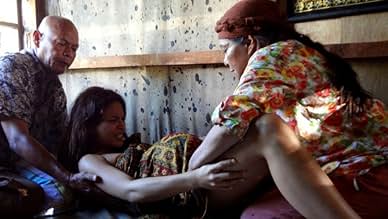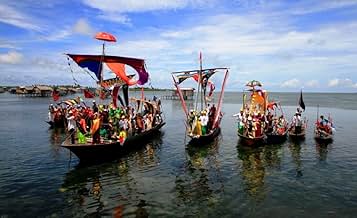Aggiungi una trama nella tua linguaAn infertile midwife and her husband find a surrogate mother so that they can have a child.An infertile midwife and her husband find a surrogate mother so that they can have a child.An infertile midwife and her husband find a surrogate mother so that they can have a child.
- Regia
- Sceneggiatura
- Star
- Premi
- 20 vittorie e 45 candidature
Richard Najid
- Bangas-An's Brother
- (as Richard 'DJ Troy' Najid)
Trama
Lo sapevi?
- QuizIn Competition, 3rd Sakhalin International Film Festival "On the Edge".
Recensione in evidenza
This movie shows us that the plot need not be too complicated in order for it to be of artistic merit. "Thy Womb" continues Director Brillante Mendoza's successes in the international independent film circuit. It also brings the long-missed talents of Philippine Superstar Ms. Nora Aunor back on to the big screen. Despite being denied of any of the three Best Picture awards at stake at the Metro Manila Film Fest this year, I believe this film should be seen by all for its cultural value.
Its story can be told in one sentence. A middle-aged childless Moslem Badjao woman named Shaleha (Nora Aunor) living in Tawi-tawi finds a suitable second wife for her husband Bangas-An (Bembol Roco) to have a child of his own, unmindful of the consequences this decision might impose on her.
Director Mendoza intertwines very colorful scenes of daily Badjao life and culture to beef up the sparse story line, creating a brilliant visual spectacle that would educate us about how our Badjao countrymen live. We see how they live on their houses on stilts, weave mats, catch fish, dress wounds, do their marketing, and mainly, how they negotiate dowry and get married. I feel these scenes really brought me into their difficult and uncomfortable living conditions. I felt like I was actually there given the realism of execution.
Ms. Nora Aunor has a face that can communicate a multitude of emotions with no words spoken. This is as true now as it was back then. Director Mendoza certainly gives us a lot of scenes which makes the faded superstar shine with megawatt luster. The things Ms. Nora did in the course of shooting this film are obviously arduous when we see the finished product. She really immersed herself in this tough environment and was as real as she could be. There she was, paddling a boat under the hot sun and even swimming in the open sea. Nora did not care how old, disheveled or haggard she looked, delivering a riveting performance as only she can. Nora's signature scenes of staring out into space with those expressive eyes brimming with tears still works wonders.
OK this film is not perfect by any means. There were scenes that seemed to lead nowhere. There were scenes of endless waiting. The ending sequences seemed rushed to meet a deadline, or something. In the climactic wedding scene, we only see a dance number, not even the bride and groom. I also do not see how a graphic scene of a baby coming out of a woman's vagina can be "gender sensitive" as this film had awarded. This is again Mr. Mendoza shocking his audience, as he does in all his other films.
However, aside from Ms. Aunor, the star of this film is really its cinematography. All the colors were absolutely brilliant. The composition of scenes was very aesthetically appealing. The sun, the sea, the whale sharks, the quarter moon were captured in their glorious beauty. In addition, the production design was also very admirably authentic. After watching, we feel we already knew Tawi-tawi and its people a whole lot more.
OK, this is not really for everyone as most indie films are, but this could already be the most commercial of Mendoza's films. This special film lets us in to see and experience the unique way of life of this marginalized tribe with the best possible images. For this alone, "The Womb" comes highly recommended.
Its story can be told in one sentence. A middle-aged childless Moslem Badjao woman named Shaleha (Nora Aunor) living in Tawi-tawi finds a suitable second wife for her husband Bangas-An (Bembol Roco) to have a child of his own, unmindful of the consequences this decision might impose on her.
Director Mendoza intertwines very colorful scenes of daily Badjao life and culture to beef up the sparse story line, creating a brilliant visual spectacle that would educate us about how our Badjao countrymen live. We see how they live on their houses on stilts, weave mats, catch fish, dress wounds, do their marketing, and mainly, how they negotiate dowry and get married. I feel these scenes really brought me into their difficult and uncomfortable living conditions. I felt like I was actually there given the realism of execution.
Ms. Nora Aunor has a face that can communicate a multitude of emotions with no words spoken. This is as true now as it was back then. Director Mendoza certainly gives us a lot of scenes which makes the faded superstar shine with megawatt luster. The things Ms. Nora did in the course of shooting this film are obviously arduous when we see the finished product. She really immersed herself in this tough environment and was as real as she could be. There she was, paddling a boat under the hot sun and even swimming in the open sea. Nora did not care how old, disheveled or haggard she looked, delivering a riveting performance as only she can. Nora's signature scenes of staring out into space with those expressive eyes brimming with tears still works wonders.
OK this film is not perfect by any means. There were scenes that seemed to lead nowhere. There were scenes of endless waiting. The ending sequences seemed rushed to meet a deadline, or something. In the climactic wedding scene, we only see a dance number, not even the bride and groom. I also do not see how a graphic scene of a baby coming out of a woman's vagina can be "gender sensitive" as this film had awarded. This is again Mr. Mendoza shocking his audience, as he does in all his other films.
However, aside from Ms. Aunor, the star of this film is really its cinematography. All the colors were absolutely brilliant. The composition of scenes was very aesthetically appealing. The sun, the sea, the whale sharks, the quarter moon were captured in their glorious beauty. In addition, the production design was also very admirably authentic. After watching, we feel we already knew Tawi-tawi and its people a whole lot more.
OK, this is not really for everyone as most indie films are, but this could already be the most commercial of Mendoza's films. This special film lets us in to see and experience the unique way of life of this marginalized tribe with the best possible images. For this alone, "The Womb" comes highly recommended.
I più visti
Accedi per valutare e creare un elenco di titoli salvati per ottenere consigli personalizzati
Dettagli
- Tempo di esecuzione1 ora 45 minuti
- Colore
Contribuisci a questa pagina
Suggerisci una modifica o aggiungi i contenuti mancanti















